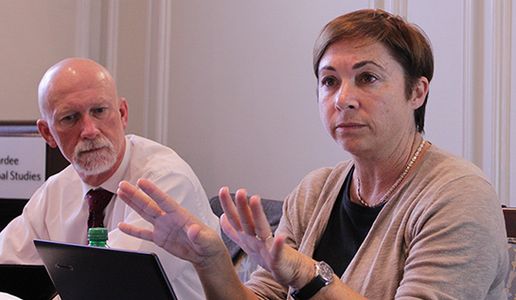Eisin Shares Israel’s Views on Iran Deal
At a recent event at the Frederick S. Pardee School of Global Studies at Boston University, a challenging view of the Iran nuclear deal was presented – the perspective of Israel.
“An Israeli View of the Iran Nuclear Deal” took place Oct. 29 and discussed an Israeli perspective on the Iran Nuclear Deal.
“This isn’t the view of the U. S., the view of the world. It’s the view of Israel. And as an Israeli, I look at the Iran nuclear quest and I cannot separate it from the larger context of stated enmity toward Israel.” Those were the words of Miri Eisin, a retired Israeli army colonel and media adviser to former Israeli Prime Ministers Ariel Sharon and Ehud Olmert.
In her talk, Eisin showed a series of maps of the region, reminding attendees that while Israel and Iran do not share a border, Israel and Syria do.
“The Syrian and Iranian strategic alliance goes back 30 years, back to the regime of former Syrian President Hafez al-Assad, current President Bashar al-Assad’s father,” Eisin said. “In Iranian media, you can read the words of Iranian leaders attacking Israel as a ‘zionist regime’ and ‘little Satan.’ This does not make Israel feel comfortable.”
Eisin also detailed connections between Iran and Hezbollah, a Lebanese extremist group whose goal is the elimination of the Israeli state.
“The biggest Israeli critique of the nuclear deal is that it is strictly about nuclear programs, and doesn’t take into account this larger context,” Eisin said. “Israelis feel threatened and concerned about the broader picture.” She also discussed the link between the nuclear deal and the status of the Assad regime in Syria, which has implications for the West in the form of Syria’s burgeoning refugee crisis.
The last map Eisin showed displayed the region between Iran and Israel, with flight plans displayed between Israeli bases and known Iranian nuclear sites.
“We have examples in the past of Israel taking actions they feel is necessary to protect their existence,” Eisin said.
The event’s discussant was Amb. Robert Loftis, Professor of the Practice of International Relations at the Pardee School.
“This is the perspective I was hoping our attendees would learn,” Loftis said. “It’s important to hear how current events will effect people with differing views from the U. S.”
